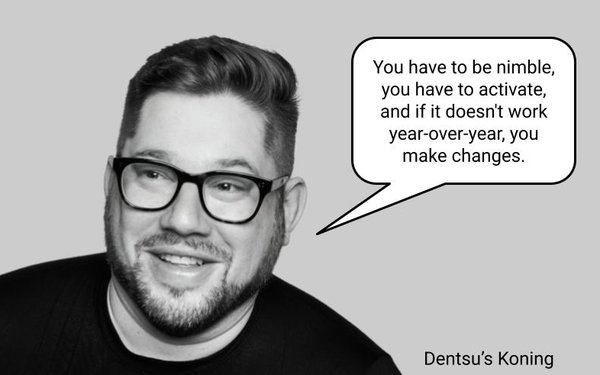
As I read a recent report published by Dentsu about the burgeoning gaming industry, it seemed to me to be part manifesto, part love
letter and part cheat sheet. But I'm not its target audience. Marketers still uncertain about making gaming investments are.
The findings -- which show the average age of gamers rising as well
as new opportunities in measurement and profitability across sectors -- make the case for adopting long-term gaming strategies as a way to prepare for the very near future.
“We need to
get upstream with gaming strategy and planning and execution and delivery,” says Brent Koning, Dentsu's gaming lead, who told MediaPost that having a gaming plan is the equivalent of having a
social media plan 15 years ago. “Anyone who made a plan that did not include a social media marketing plan today would be fired.”
advertisement
advertisement
Koning and his team at Dentsu want to see the
advertising industry pull forward an upper-funnel, upstream strategy placement for gaming. “As that starts to trickle down, you get planning earlier and all the benefits of being integrated into
a marketing campaign that you would out of home,” he says.
Yet less than 5% of global advertising spend is devoted to gaming. And since 2021, the share of advertisers planning to
increase spend on gaming has actually fallen 20 percentage points -- from 72% to 52%.
Perhaps one of the most surprising findings presented in Dentsu's report relates to the age of the average
gamer, which is currently 37 years old. Koning believes that this means gamers have become wiser, with more disposable income and an understanding and appreciation of popular video game IPs, meaning
that brands can make use of legacy fandom to meet their desired consumers.
This is especially notable for entertainment franchises that are interested in expanding into gaming.
According to the report, 51% of people feel favorable about entertainment franchises expanding into gaming, while two-thirds of gamers switch between gaming and entertainment content within the
same hour.
The majority (75%) of luxury buyers also identify as gamers, and over half the luxury buyers prefer to play games on their smartphones.
Throughout the report, Dentsu
provides case studies and user statistics, making the point that brands across industries -- including consumer packaged goods (CPG), quick-service restaurants (QSR), and Automotive -- can benefit
from in-game launches.
For example, the agency found that gamers are an ideal audience for convenience stores, with 84% of 7-11 shoppers playing games weekly, while 57% of gamers are the main
food shopper for their household. As for QSR, Dentsu found that 51% of gamers would like to have the ability to order food directly from a game.
In terms of automotive, Porsche recently
released a collaboration with the game Overwatch 2 to promote their fully electric vehicle line because they found that Overwatch players were 2.5 times more likely than average to already own a
Porsche and 64% more likely to be in the market for an electric car.
Gaming is also an opportunity for snacking occasions, the report shows, providing marketers with the opportunity to keep
buyers engaged with a brand between purchases, especially with candy. Overall, gamers are 48% more likely to be motivated by in-game rewards for ads.
The report also includes important
insights with regard to the power of indie games, social games, gaming as a cultural-catalyst, how to utilize gaming influencers for UGC, and more. But more bluntly, Koning just wants to tell
marketers one thing -- that they don't need permission anymore.
“Send this to your CMO,” he says. “Then get ready to go pitch for more budget…this report is literally
a cheat sheet for presenting a gaming plan.”
Moving gaming more directly into the mainstream marketing mix would prevent it from being cut, Koning contends, leading to the development of
a clear-cut narrative of how brands can participate in gaming.
“You have to be nimble, you have to activate, and if it doesn't work year over year, you make changes,” Koning adds.
“That's what we're pushing our clients to do.”